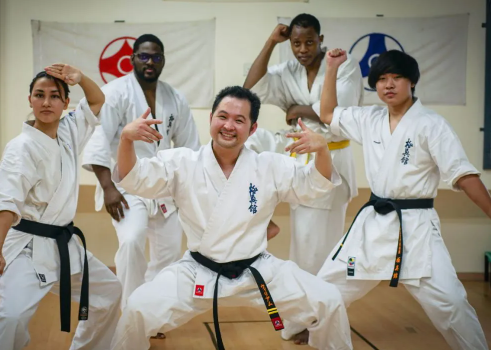Karate Personal Training: The Ultimate Guide to One-on-One Martial Arts Coaching
Karate is more than just a martial art — it’s a lifelong journey of discipline, skill, and self-improvement. While group classes have been the traditional way to learn karate, many practitioners today are turning to karate personal training for faster progress, customized instruction, and flexible scheduling.
Whether you are a beginner looking to master the basics, an advanced karateka aiming to refine technique, or someone focused on self-defense and fitness, personal training in karate offers a tailored path to reach your goals.
This guide will explore the benefits, structure, techniques, and expectations of karate personal training, along with practical advice on choosing the right instructor and maximizing your results.
Karate personal training refers to one-on-one or small-group sessions with a qualified karate instructor. Unlike standard dojo classes that follow a set curriculum for a large group, personal training focuses entirely on your individual goals, pace, and challenges.
This format allows for:
- Highly personalized feedback.
- Greater focus on specific techniques.
- Flexible scheduling.
- Faster progression through belts (if desired).
Benefits of Karate Personal Training
Individualized Attention
In group classes, an instructor may have to divide attention among many students. Personal training means you are the sole focus, ensuring every movement is corrected and refined.
Accelerated Learning
Because your training is customized, you can spend more time on weak areas and less on skills you’ve already mastered. This targeted approach leads to quicker skill development.
Flexible Goals
Personal karate training can be tailored to different objectives, such as belt testing preparation, competition readiness, fitness and weight loss, self-defense skills, or even rehabilitation after injury.
Confidence Building
Some students feel nervous in group settings. Private lessons provide a safe, comfortable space to learn without performance anxiety, helping you build confidence in your abilities.
Detailed Technique Correction
Small mistakes can go unnoticed in large classes. One-on-one sessions allow your instructor to spot and fix even minor errors, improving precision and efficiency.
Who Should Consider Karate Personal Training?
Karate personal training is ideal for:
- Beginners who want to build a strong foundation before joining group classes.
- Busy professionals who need flexible training times.
- Competitive athletes who want focused preparation.
- Children who require more attention or have unique learning needs.
- Seniors seeking a low-impact, safe, and adaptive martial arts program.
What to Expect in a Karate Personal Training Session
Warm-Up and Stretching
Every session begins with a customized warm-up to prepare your muscles and joints, followed by dynamic stretches to improve flexibility and prevent injury.
Technical Drills
Your instructor will guide you through kihon (fundamentals), including stances, strikes, kicks, and blocks, all adjusted to your level and progress.
Kata Practice
Kata — choreographed forms — are refined step-by-step with close attention to detail, timing, breathing, and application.
Kumite and Self-Defense
Depending on your goals, personal training may include controlled sparring (kumite) and realistic self-defense drills to prepare you for real-world situations.
Conditioning
Strength, balance, and endurance exercises tailored to karate movements help improve power, stability, and injury prevention.
Cool-Down and Feedback
Sessions often end with light stretching and a review of your progress, along with personalized tips for practicing at home.
Choosing the Right Karate Personal Trainer
Qualifications
Look for an instructor who holds a recognized black belt rank from a reputable organization, has teaching certifications in karate, and can provide student references or testimonials.
Teaching Style
Some trainers focus heavily on tradition and discipline, while others take a modern, sport-oriented approach. Choose a trainer whose style matches your learning preferences.
Experience Level
An instructor with competition, self-defense, and teaching experience will bring a broader skill set to your training.
Personality Fit
Since you’ll be spending a lot of one-on-one time together, find someone whose teaching style motivates and inspires you.
Karate Personal Training for Different Goals
Belt Advancement
Private lessons can speed up belt promotions by focusing on the exact requirements of your rank test and ensuring you are fully prepared.
Competition Preparation
If you plan to compete, personal training can sharpen your kata, improve your kumite strategy, and help you develop mental focus under pressure.
Fitness and Weight Loss
Some students choose karate personal training purely for fitness benefits, incorporating high-intensity drills, flexibility work, and strength training.
Self-Defense
Private karate sessions can be adapted to teach realistic and effective self-defense techniques for various scenarios, from street encounters to home safety.
Rehabilitation and Mobility
If you are recovering from an injury or have mobility limitations, a skilled instructor can design safe karate movements to help improve range of motion and strength.
The Role of Kata in Karate Personal Training
Kata is central to karate, combining sequences of movements into choreographed patterns that simulate combat. In personal training:
- Each movement is broken down in detail for accuracy.
- Applications (bunkai) are demonstrated and practiced.
- Stance transitions, breathing control, and rhythm are refined for maximum effectiveness.
Kumite and Controlled Sparring
One-on-one kumite sessions allow for targeted improvement in timing, distancing, and strategic decision-making. Your instructor can act as a sparring partner, helping you anticipate and counter techniques more effectively.
Conditioning and Cross-Training
Karate personal training often integrates additional conditioning work to enhance performance, including:
- Core strengthening for stability in stances.
- Plyometric drills for explosive kicks.
- Resistance training for powerful strikes.
- Balance and agility exercises for better footwork.
Safety in Karate Personal Training
One major advantage of personal training is adaptability. Instructors can adjust intensity, technique selection, and training pace to match your fitness level and prevent injury. This makes it particularly valuable for beginners, seniors, and athletes in rehabilitation.
How to Maximize Results from Karate Personal Training
- Practice between sessions to reinforce what you’ve learned.
- Set clear goals with your trainer so every session is purposeful.
- Track your progress with videos or a training journal.
- Communicate openly about what works for you and where you need more help.
Common Myths About Karate Personal Training
“It’s Only for Elite Students”
Beginners often benefit the most from private instruction because it gives them a strong foundation from the start.
“It’s Too Expensive”
While personal training costs more than group classes, the faster progress and focused attention often make it worth the investment.
“You Miss Out on Social Aspects”
Many students combine private lessons with occasional group classes to enjoy both the benefits of personalized learning and the community experience.
Karate Personal Training vs. Group Classes
In personal training, all attention is on you, the pace is fully customized, and the schedule is flexible. Group classes, while less costly, follow a set pace and offer more social interaction. Many students find a combination of both formats to be the most effective approach.
See Also: Why WPC Composite Decking Is the Best Choice for Your Home’s Outdoor Space
The Future of Karate Personal Training
With modern technology, karate personal training is expanding beyond the dojo. Students can take hybrid lessons, record their techniques for instructor feedback, and access training plans online. This allows for continuous improvement even outside scheduled sessions.
Conclusion
Karate personal training is one of the most effective ways to improve your martial arts skills, whether you are a complete beginner, a competitive athlete, or someone seeking self-defense and fitness benefits. The personalized attention, flexible structure, and focused instruction create an environment where progress is faster, technique is sharper, and confidence grows stronger.
If you’re serious about your karate journey, investing in personal training could be the most important step you take toward mastery. By working closely with a skilled instructor, you’ll unlock your potential, refine your abilities, and deepen your understanding of this timeless martial art.

